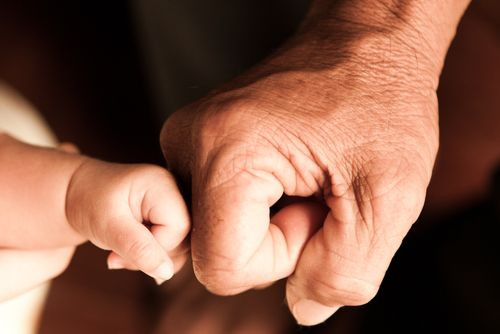Why A Fist Bump Is More Hygienic Than A Handshake: A Dap Is 4 Times Less Likely To Spread Bacteria

A fist bump may be more than just the young, cooler way to greet someone; it could possibly hold the answer in preventing the spread of bacteria. According to a recent study, a dap can reduce the transmission of antibiotic-resistant bacteria up to about four times compared with a handshake.
The fist bump was reintroduced to the public in June 2008 during President Obama’s campaign trial when the President and first lady Michelle Obama walked on stage in Minnesota to claim the Democratic nomination. The couple’s fist bump became known as “the fist bump heard 'round the world.” Since the dap on stage, the gesture has steadily become more common among politicians, including former U.S. President George W. Bush.
Others, like Howie Mandel, host of Deal Or No Deal, confessed he suffers from obsessive compulsive disorder (OCD) as he fist bumps contestants to work around his germ anxiety. "In my mind [my hand] is like a petri dish. ... Otherwise I would spend the day, as I have in the past in my life in the men's room rubbing and scrubbing and scalding," Mandel told ABC News. Mandel’s fist-bump tactics are in fact a healthier, safer, and more hygienic alternative to the traditional handshake, researchers believe.
Handshaking is known to play a role in the bacterial transmission between individuals despite hand washing. Even though health care systems have tried to reduce transmission rates through promoting effective hand washing, 80 percent of individuals are still found to retain some disease-causing bacteria, say West Virginia University researchers.
Published in the Journal of Hospital Infection, Dr. Tom McClellan, a West Virginia plastic surgeon, and his colleagues conducted a study to evaluate whether a handshake or a fist bump is more effective in reducing pathogen transmission in a hospital setting. The clean-handed participants in the study shook hands and fist bumped and cultured the bacteria on their hands afterward.
Dr. McClellan acknowledged the presence of MRSA (methicillin-resistant Staphylococcus aureus), a difficult-to-treat, antibiotic-resistant bacterial infection prevalent in hospitals in his defense in favoring fist bumps over handshakes. When a doctor treats as patient that has MRSA, they usually put on a gown and wash their hands. However, when the patient’s family is there, doctors usually do not have their gown and “…go shake their hands, which probably have MRSA on [them],” he told National Geographic.
In the study, the researchers found replacing the handshake with a fist bump in a health care setting may further reduce bacterial transmission between health care providers by reducing contact time and total surface area exposed. The handshake was found to expose three times as much skin to bacteria as the fist bump, and the skin was in contact 2.7 time longer, which led to a greater spread of bacteria.
“We surmise that the fist bump is an effective alternative to the handshake in the hospital setting,” the researchers wrote. “[Bumping] may lead to decreased transmission of bacteria and improved health and safety of patients and health care workers alike.”
Although the results were done within the confines of a hospital setting, the effects of fist bumping may be adopted in daily life. Antibacterial cloths and alcohol sanitizers are considered to be ineffective against some bacteria due to the different kinds of pathogens individuals are exposed to in the community. McClellan advises fist bumpers they must still wash their hands, use alcohol sanitizers and limit their exposure to bacteria as a way to keep clean and protect themselves from diseases.
A fist-bumping alternative to reduce germs is especially useful since studies have highlighted only a small percentage of individuals wash their hands correctly. In a study from Michigan State University, researchers found only five percent of the popilation washes their hands correctly. The majority of people who wash their hands after using the bathroom do not wash them long enough for the soap to effectively kill the bacteria living on the hands. One-third of all the people who did wash their hands didn't even use soap, and 10 percent of people didn't wash their hands at all after using the bathroom.
Perhaps the fist bump will help promote a cleaner and cooler way to greet someone while limiting the transmission of bacteria.
The Centers for Disease Control and Prevention says hand washing is the number one way to prevent the spread of infections. Individuals are advised to wash their hands with soap for 15 to 20 seconds until they see a good buildup of lather.
To learn more about when and how to wash your hands, click here.
Source: Bourlai T, Dutton W, Ghareeb PA et al. Reducing pathogen transmission in a hospital setting. Handshake verses fist bump: a pilot study. Journal of Hospital Infection. 2013.



























